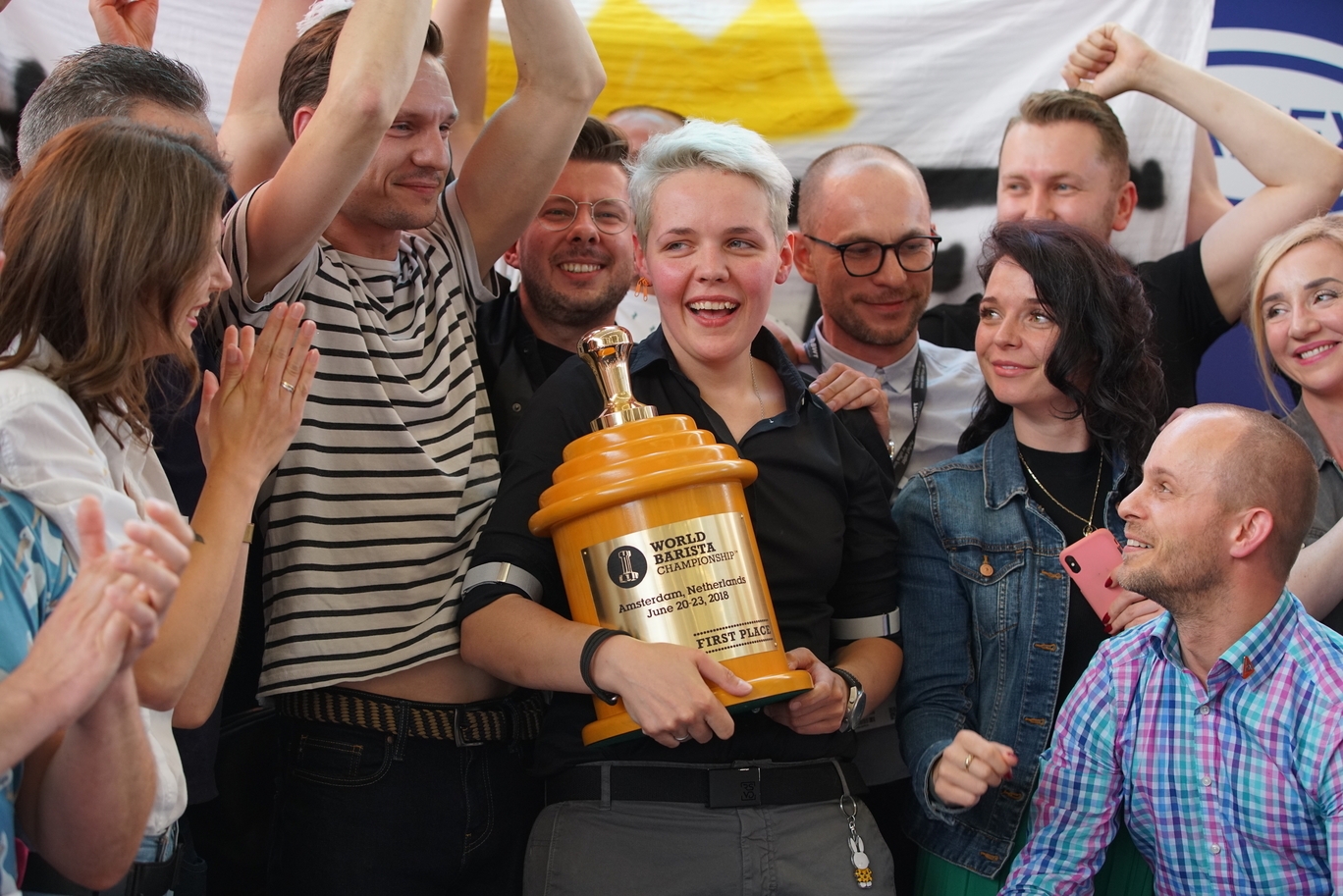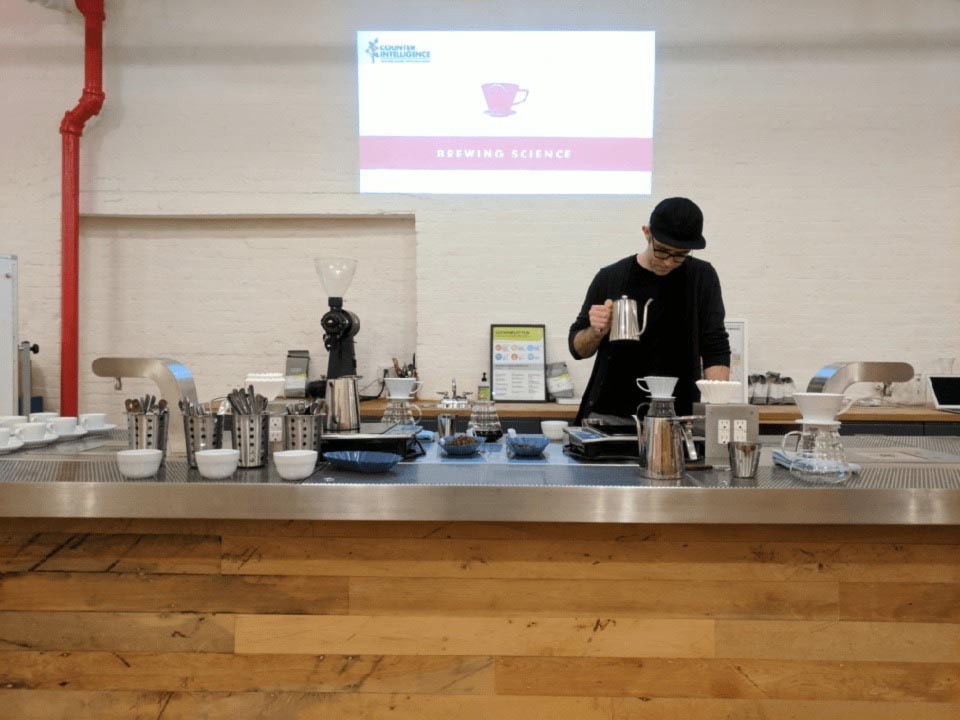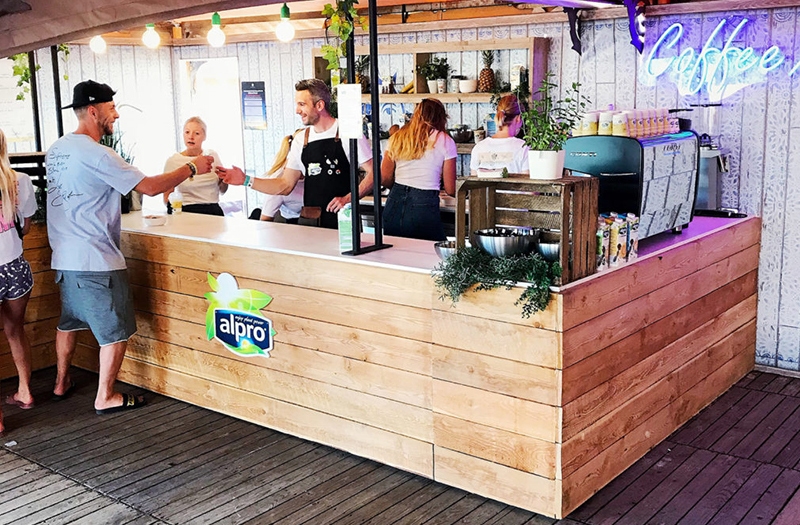
After four days and three rounds of competition at the RAI Exhibition Centre in Amsterdam, Agnieszka defeated 55 other national barista champions to win the 2018 WBC, the 19th year of the competition. Agnieszka was the only female competitor who earned her way to the final round, which also included (from 2nd place to 6th place) Lex Wenneker of the Netherlands, Mathieu Theis of Switzerland, Michalis Katsiavos of Greece, Cole Torode of Canada, and John Gordon of New Zealand.
Even before Agnieszka was announced as the winner, as she stood to the side of the stage with five male competitors, one could sense the crowd hoping to see history in the making. Lem Butler, the 2016 U.S. Barista Champion and WBC Finalist twice yelled his support for Agnieszka from the WBC bleachers, “I love you, Aga!”
Once her name was called out for first place, the packed-to-capacity crowd at the RAI exploded to its feet, chanting “Rojes, Rojes!”, the nickname of the new World Barista Champion.
“I’m super excited,” Agnieszka said after her performance in the finals. “I never thought that I would be in the finals, so [this is] the best experience ever. I’m super happy.”

Agnieszka Rojewska's WBC Performance
Agnieszka stole the WBC stage with a performance theme that was particularly relevant for this moment in time for specialty coffee. As baristas today are challenged with engaging with all types of consumers in a coffee shop, Agnieszka showed the audience and the judges how to adjust service style according to the customer’s level of experience with specialty coffee, sharing just the right amount of coffee information based on their background.

Course 1: The Milk Beverage
Agnieszka began her presentation with her milk beverage, in which she treated the judges as if it were their “first time in a specialty coffee café.” She described the milk beverage as a “simple and delicious start to a coffee friendship,” and allowed the judges to enjoy the beverage and the experience without information overload.
Like all three of her courses, she used an Ethiopian coffee for the milk beverage, because the flavors of yellow and red fruit are easy to recognize, and it was the first coffee she fell in love with. She called out flavor notes of milk chocolate and warm strawberry jam when mixed with the milk. Because the milk was full-fat and a lower temperature, she said the beverage had a creamy texture with “dessert-like character”, which reminded her of soft, melting milk-chocolate ice cream.

Course 2: The Signature Beverage
For Agnieszka’s second course, the signature beverage, she presented to the judges as if they were “becoming a regular in specialty coffee café.” She said this scenario is the perfect opportunity for her and other baristas to share more coffee information as the customer becomes eager for more knowledge and experience.
Without lecturing the judges, Agnieszka provided more backstory of the coffee, and the different stages of preparation of her signature beverage. She revealed that the coffee she was preparing was an Ethiopian Heirloom, a white flower varietal, that comes from the Messina village, a new growing area. The area’s soil is fresh and full of nutrients, and the trees themselves are just 10 years old, which gives the coffee more intense yellow characteristics.
Agnieszka’s signature beverage called for an infusion of passionfruit, coconut sugar and water, which was slowly cooked over three hours at 60 degrees Celsius to extract more natural tropical flavor notes out of the beverage. She also used warm milk as an ingredient in the beverage, to which she added lime juice, which acted as a citric acid. After three hours and three strains of the mixture, she produced 20 grams of washed milk to give her signature beverage a creamier mouthfeel. These elements were balanced with six espressos, brewed with 20 grams of coffee to produce 35 grams of liquid espresso, to transform the yellow fruit notes into a more tropical taste.
After blending and serving her signature beverage, Agnieszka tasted it along with the judges to connect the information with the experience in the final cup, describing different qualities of the drink with each sip. She focused the judges’ attention of the first sip on the beautiful flavors of passionfruit and apricot, the second sip on the creamy texture, and the third sip on the note of strawberry that was present in the milk beverage of the first course.

Course 3: The Espresso
For her final course, Agnieszka asked the judges to walk around her stage configuration to a different countertop, where she would serve her favorite cup of coffee – an espresso. In this new environment, Agnieszka had set up various props to support her descriptions of the different characteristics of the espresso. To represent medium sweetness, medium acidity, and medium bitterness, she asked the judges to slide three colored beads to the center of an abacus-like mechanism. To show the roundness and medium-weight of the coffee, she directed the judges to pick up a wooden ball. And to experience the changing texture of the espresso, she had the judges place their hand along a multi-layered fabric to physically feel the velvet running into silk.

It was no accident that Agnieszka centered her presentation around the idea of tailoring the style of customer service. She previewed this theme to a tee when she was asked before arriving in Amsterdam how she sees the coffee industry changing in the future.
“We as baristas will go back to what is most important – education of our customers with extraordinary service that will provide knowledge and great experience to every coffee user.”
And now, after earning the influential platform of World Barista Champion, Agnieszka Rojewska can use her boundless passion and skills even further to enhance the way people experience coffee, one customer at a time.
Urnex is proud to be the Qualified Cleaning Sponsor of the World Barista Championship and the World Coffee Championships.


